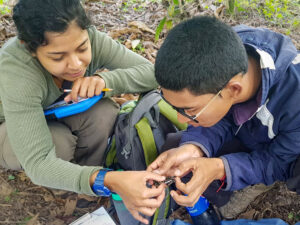News
USDA Youth Conservation Corp and Jane Goodall Institute/Roots & Shoots Chapter
As an offshoot of our outreach, we will be selecting two youths from Yoro to complete the training program with the USDA funded Youth Conservation Corp. Through a grant with USDA, MDI will support their 6-month training (room and board, and 8 months stipend). These youth from the Yoro region will be involved in starting a Roots & Shoots chapter for youth education with the Jane Goodall Institute. Dr. Goodall is lending support to the Yoro Biological Corridor, and Honduras does not yet have a Roots & Shoots chapter. Roots & Shoots promotes STEM education, service learning, and social and environmental justice issues
Yoro Tour
A group of 2 MDI representatives, 2 IOC Farmers and a representative of our project (PhD student, Ana Quiñonez) visited 11 municipalities to present the Yoro Model and Yoro Biological Corridor. During these visits with municipal authorities, we obtained five letters of support for the Yoro Biological Corridor, as well as requests for future visits to present our project to other municipal authorities.
Specialty Coffee Association annual meeting
On April 8-10 2022, in Boston, USA, Dave King (USFS), Richard Trubey (MDI), and David Murillo attended the SCA 2022 annual meeting. David M. presented a poster entitled “Integrated Open Canopy (Ioc) Coffee (Coffea Arabica) As A Conservation Tool For Nearctic-Neotropical Migratory And Resident Birds In Yoro, Honduras”. All collaborators engaged in meetings with Sustainable Coffee challenge organizers. The presentation of the poster was on Friday, April 8, between 1:00 pm and 3:00 pm, during the Specialty Coffee Expo (Specialty Coffee Expo), during the poster presentation the objectives and results of the research were briefly explained to the people interested in it.
UNCW Researcher Part of NSF Grant to Explore Economics of Sustainable Coffee
UNCW Economics Professor Peter Schuhmann has been awarded $55,278 as part of a more than $3 million grant from the National Science Foundation to investigate a new sustainable system for coffee cultivation. The grant, “GCR: Collaborative Research: Designing a Sustainable Agriculture Production System through Convergence Research Using a Multi-Scale Ecosystems Approach,” is funded for two years with an additional three years possible. It is part of the NSF’s support of convergence research, which brings together knowledge, methods and expertise from different disciplines to solve complicated societal problems. Read more here.
“Drinking our way to sustainability, one cup of coffee at a time”
Coffee, that savior of the underslept, comes with enormous environmental and social costs, from the loss of forest habitats as woodlands are converted to crops, to the economic precarity of small-scale farmers whose livelihoods depend on the whims of international markets. Now, thanks to a National Science Foundation (NSF) grant of $979,720, Timothy Randhir, University of Massachusetts Amherst professor of environmental conservation, and David King, of the USDA Forest Service Northern Research Station, will embark upon a five-year effort to make Honduran coffee sustainable across environmental, economic and social fronts. Read Here the University of Massachusetts press release.
Tulane professor wins $2 million grant to make coffee growing more sustainable

Tulane PhD student Fabiola Rodríguez, left, conducts research with Honduran biologist David Murillo on a coffee farm in Yoro, Honduras. (Photo by Darío Alvarado)
Caz Taylor was awarded a $2 million grant from the National Science Foundation’s Growing Convergence Research program. This 5-year endeavor will help transform coffee production in Honduras into an industry that is environmentally, economically and socially sustainable. Click here to read more about this new project!